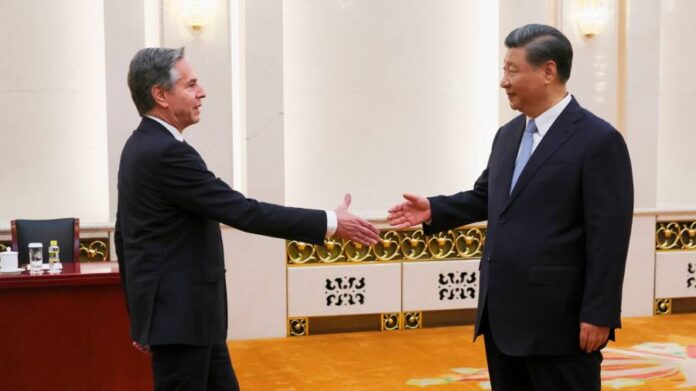The US and China have made “progress” in stabilising plunging bilateral relations, Xi Jinping declared on Monday as the Chinese president held a long-delayed meeting with US secretary of state Antony Blinken.
Xi’s comments represent the strongest signal yet that Beijing is willing to consider a truce in its increasingly acrimonious relationship with Washington.
Speaking in the Great Hall of the People with Blinken, the first US secretary of state to visit the Chinese capital since 2018, Xi said that whether China and the US could get along had a “bearing on the future and destiny of mankind”.
“The two countries should properly handle Sino-US relations with an attitude of being responsible to history, the people and the world,” Xi said. In extensive talks between senior Chinese officials and Blinken during his visit, “the two sides . . . made progress and reached agreement on some specific issues”, he added.
Blinken told journalists after the meeting he agreed that both countries “have an obligation to manage this relationship responsibly”.
“It was clear coming in that the relationship was at a point of instability and both sides recognised the need to work to stabilise it,” Blinken said. This meant establishing “better lines of communication” to ensure that “competition doesn’t veer into conflict”.
“It’s in the interests of the United States to do that, it’s in the interests of China to do that, it’s in the interests of the world and I think we took a positive step in that direction over the past few days,” Blinken added.
He had been scheduled to travel to Beijing early this year. But the trip was postponed after an alleged Chinese spy balloon flew over sensitive military sites in the US before it was shot down in February.
Ties between the countries have foundered, with the US concerned about China’s increasing military activity around Taiwan and its refusal to condemn Russia over its invasion of Ukraine.
Beijing, meanwhile, accuses Washington of imposing export controls on advanced technology and strengthening security arrangements with regional allies to strategically contain China’s ambitions.
John Delury, a China expert at Yonsei University in Seoul, said the lack of substance in Blinken’s talks while in Beijing — there were no “big-ticket items” under negotiation other than to agree to talk — was a measure of the deterioration of the relationship.
“It is symptomatic of how bad the relationship has gotten that it’s an achievement to talk,” said Delury. “That it is almost a sign of political courage to meet with your counterparts.”
The Biden administration is keen to re-establish diplomacy and open channels of communication with Beijing to reduce the risk of what it calls “misperception and miscalculation” in the relationship.
China, meanwhile, is wrestling with flagging economic growth and worsening foreign investment sentiment that has been exacerbated by tensions with the US.
Blinken said on Monday that one priority was promoting military-to-military communication. This follows close calls between Chinese and US aircraft and vessels near Taiwan and the South China Sea.
“This is also something that I raised repeatedly during this trip, it’s absolutely vital that we have these kind of communications,” Blinken said.
Xi told Blinken that China respected US interests and would not “challenge or replace the United States”.
“Similarly, the United States must also respect China and not harm China’s legitimate rights and interests. Neither party can shape the other according to its own wishes, let alone deprive the other of its legitimate right to development,” China’s president said.
Blinken argued that the US was not trying to “contain” China or decouple from its economy, but was taking targeted measures to withhold technology that could assist Chinese security-focused programmes such as the development of nuclear weapons and hypersonic missiles.
“How is it in our interests to provide those specific technologies to China?” he said. “We can, we will and we must take steps necessary to protect our national security. If the shoe was on the other foot, I have no doubt that China would do exactly the same thing.”
Blinken’s meeting with Xi followed his talks with China’s top diplomat Wang Yi, who called for Washington and Beijing to reverse a “downward spiral” in relations.
On Sunday, Blinken also held five-and-a-half hours of talks with Chinese foreign minister Qin Gang.
Blinken and Qin agreed to “effectively manage differences and advance dialogue, exchanges and co-operation”, including increasing the number of people-to-people exchanges and flights between their countries, Chinese state media said.
Analysts said the attempts to restart dialogue could help lay the ground for a face-to-face meeting between Xi and President Joe Biden during a summit of the Asia-Pacific Economic Cooperation forum in the US in November.
Additional reporting by Maiqi Ding in Beijing
Credit: Source link















